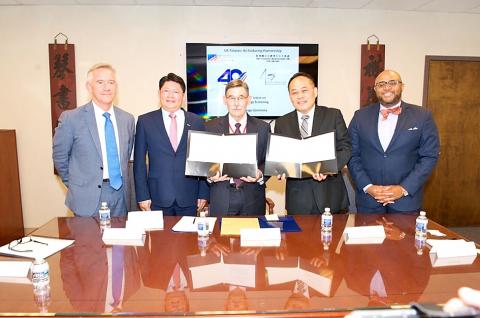US travelers transiting through Taiwan Taoyuan International Airport are to be exempt from having their checked baggage screened after the two nations exchanged letters of intent on one-stop security cooperation, the Ministry of Transportation and Communications said in a statement yesterday.
The letters were exchanged by American Institute of Taiwan (AIT) Washington Trade and Commercial Programs Director Rick Ruzicka and Deputy Representative to the US Louis Huang (黃敏境) at a ceremony at the AIT’s headquarters in Washington on Tuesday.
The event was witnessed by Deputy Minister of Transportation and Communications Huang Yu-lin (黃玉霖) and US Transportation Security Administration (TSA) Executive Adviser to the US Department of State Eric Sarandrea.

Photo courtesy of the Taipei Economic and Cultural Representative Office in the US
The exchange of letters of intent would facilitate flight transfers for US travelers and greatly enhance Taoyuan airport’s efficiency in serving transit passengers, the ministry said, adding that it is also a milestone in aviation security cooperation between the two nations.
TSA and Civil Aeronautics Administration officials have since March last year been cooperating to implement a one-stop security program for people transiting at Taoyuan from San Francisco International Airport or Seattle-Tacoma International Airport to exempt passengers’ checked baggage from screening.
Since the policy produced great results, the agencies began to discuss the possibility of including travelers from other US airports in the program, the ministry said.
Prior to the exchange ceremony, Louis Huang and AIT Washington Managing Director John Norris had signed an agreement on the expansion of the one-stop security program, it added.
The nation is also seeking to participate in the US Customs and Border Protection (CBP) preclearance project, the ministry said, adding that it would soon file an application to enter the project and conduct negotiations with US officials after CBP makes public the application procedures and criteria.
If Taoyuan airport is listed as a preclearance location, it would benefit anyone traveling from Taoyuan to the US or transiting through the nation, as they would not need to undergo a second CBP inspection upon arrival in the US, the ministry said, adding that this would help the travel industries in both nations.
Currently, Taiwanese traveling to or transiting through the US must have all of their luggage inspected at their airport of first entry before proceeding to their final destination.
The preclearance project excludes cargo shipments and focuses solely on passenger processing, which includes anything a traveler owns and is bringing with them to the US, such as their luggage, clothing, souvenirs, currency or other personal effects, according to the CBP Web site.

MORE VISITORS: The Tourism Administration said that it is seeing positive prospects in its efforts to expand the tourism market in North America and Europe Taiwan has been ranked as the cheapest place in the world to travel to this year, based on a list recommended by NerdWallet. The San Francisco-based personal finance company said that Taiwan topped the list of 16 nations it chose for budget travelers because US tourists do not need visas and travelers can easily have a good meal for less than US$10. A bus ride in Taipei costs just under US$0.50, while subway rides start at US$0.60, the firm said, adding that public transportation in Taiwan is easy to navigate. The firm also called Taiwan a “food lover’s paradise,” citing inexpensive breakfast stalls

TRADE: A mandatory declaration of origin for manufactured goods bound for the US is to take effect on May 7 to block China from exploiting Taiwan’s trade channels All products manufactured in Taiwan and exported to the US must include a signed declaration of origin starting on May 7, the Bureau of Foreign Trade announced yesterday. US President Donald Trump on April 2 imposed a 32 percent tariff on imports from Taiwan, but one week later announced a 90-day pause on its implementation. However, a universal 10 percent tariff was immediately applied to most imports from around the world. On April 12, the Trump administration further exempted computers, smartphones and semiconductors from the new tariffs. In response, President William Lai’s (賴清德) administration has introduced a series of countermeasures to support affected

CROSS-STRAIT: The vast majority of Taiwanese support maintaining the ‘status quo,’ while concern is rising about Beijing’s influence operations More than eight out of 10 Taiwanese reject Beijing’s “one country, two systems” framework for cross-strait relations, according to a survey released by the Mainland Affairs Council (MAC) on Thursday. The MAC’s latest quarterly survey found that 84.4 percent of respondents opposed Beijing’s “one country, two systems” formula for handling cross-strait relations — a figure consistent with past polling. Over the past three years, opposition to the framework has remained high, ranging from a low of 83.6 percent in April 2023 to a peak of 89.6 percent in April last year. In the most recent poll, 82.5 percent also rejected China’s

PLUGGING HOLES: The amendments would bring the legislation in line with systems found in other countries such as Japan and the US, Legislator Chen Kuan-ting said Democratic Progressive Party (DPP) Legislator Chen Kuan-ting (陳冠廷) has proposed amending national security legislation amid a spate of espionage cases. Potential gaps in security vetting procedures for personnel with access to sensitive information prompted him to propose the amendments, which would introduce changes to Article 14 of the Classified National Security Information Protection Act (國家機密保護法), Chen said yesterday. The proposal, which aims to enhance interagency vetting procedures and reduce the risk of classified information leaks, would establish a comprehensive security clearance system in Taiwan, he said. The amendment would require character and loyalty checks for civil servants and intelligence personnel prior to